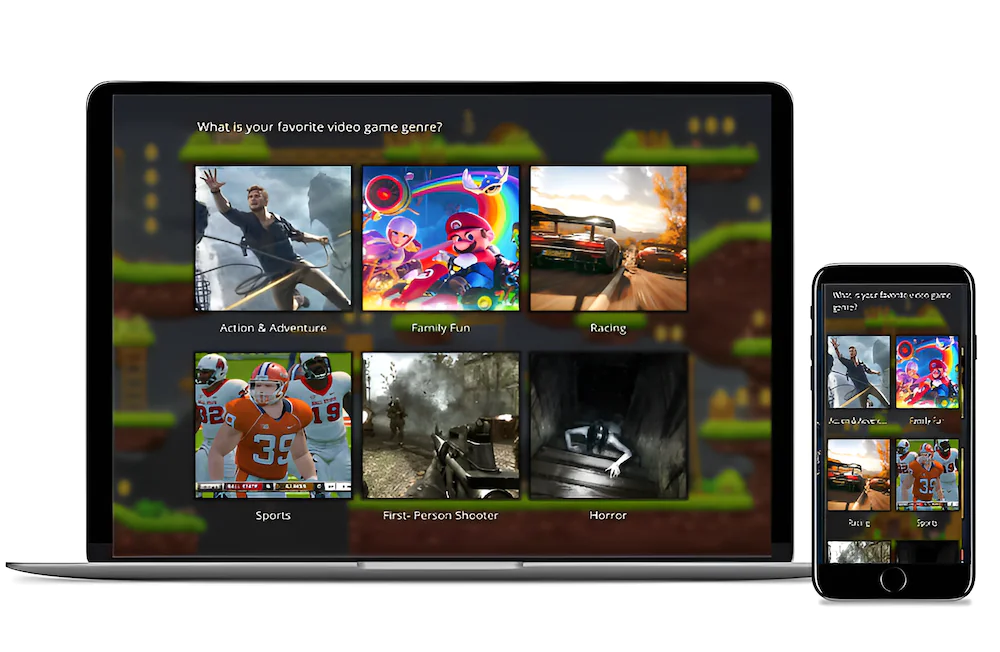From Pong to Pac Man, Super Mario to Silent Hill, the video game industry has gone through many evolutions in the last 50 years. Not only have the games changed, so has the popularity of gaming. What was once a past-time for kids and teens at the local arcade is now a full-blown lifestyle, with billions of active video gamers worldwide. This has made it increasingly important to understand players’ preferences, motivations, and behaviors. One of the most effective ways to gain these insights is through gaming surveys.
Create your FREE gaming survey now!
Video Gaming Statistics 2023
According to gaming statistics 2023, there are approximately 3.09 billion active players across the globe. This is an increase of more than 1 billion from just seven years ago (a whopping 32% jump). The number of gamers is expected to hit 3.32 billion by 2024, with the video game market growing its worth to an estimated $197.11 billion.
Asia leads the way when it comes to gaming; the continent as a whole has two times as many gamers than any other region. In fact, Asia has more active gamers than Europe, Latin America, and North America combined (1.42 billion). However, North America is by far the biggest consumer of sports-related video games.
Unsurprisingly, there are more male gamers (55%) but female gamers are catching up to them, from 38% in 2006 to 45% today. More surprisingly, the majority of gamers (80%) are over 18, putting an end to the notion that gaming is “just for kids.”
To capture your own data like this, be sure to ask demographic questions on your gaming surveys.
Pros and Cons of Video Games
Video games have become a prominent form of entertainment and a significant part of modern culture. Like any form of media, they come with their own set of pros and cons.
On the positive side, video games can enhance problem-solving and critical thinking skills, improve hand-eye coordination, and foster strategic thinking. Some video games also provide a platform for social interaction and collaboration, allowing players to connect and engage with friends and communities worldwide. Additionally, certain games can be educational, teaching players about history, science, and various other subjects.
On the negative side, excessive gaming can lead to sedentary lifestyles and reduced physical activity, which may contribute to health issues. Some games contain violent or addictive elements that can impact players negatively, especially vulnerable individuals. Moreover, excessive gaming can lead to neglect of other important aspects of life, such as academics, relationships, and responsibilities.
Because of these pros and cons, surveys can offer a lot of insight into the mindset of gamers.
5 People That Can Benefit from Video Gaming Surveys
There is immense value in surveying people about video games (and not just about their gaming scores!). Here is how gaming surveys can benefit various stakeholders, such as retailers, brands, game developers, psychologists, and educators.
1. Retailers
Retailers are always looking to better understand consumer trends and demand for various products. Surveying gamers provides valuable insights into their preferences and demand patterns. By collecting data on gaming habits, preferred genres, and purchasing behavior, retailers can tailor their inventory to match popular trends and anticipate customer needs. Surveys can also help retailers identify emerging genres, popular gaming platforms, and specific titles that appeal to their target market, leading to better stock management and increased sales. This can be extremely beneficial when purchasing inventory for the holiday season when many games, gear, and gaming systems are purchased as gifts.
Gaming Survey Questions for Retailers to Ask
- How often do you buy new video games?
- Do you consider yourself an early adopter of new video games or gear?
- What types of video games are your favorite?
- Do you try to maintain the latest video game systems and gear?
- Where do you usually purchase video games and gear?
- What influences your purchase decisions when it comes to gaming?
- Do you wait for gaming items to go on sale before making a purchase?
- How often do you purchase second-hand gear?
2. Brand Marketers
Brands need to engage with consumers throughout the product lifecycle in order to define their marketing strategies. By obtaining feedback from gamers, companies can optimize their promotional efforts. To do this, they need to look at the 4 P’s of the marketing mix. This includes product (features, branding, packaging), place (distribution channels, quantities, availability), pricing (strategies), and perhaps most important these days, promotion. Where and how a company promotes its games can have a big impact on purchase behavior. Product placement on social media channels and endorsements, as well as strategic partnerships with popular gamers and influencers, can play a big role in the marketing of a video game.
Brands may also use surveys to gauge interest in turning their games into other forms of media. Would this game sell toys? Could it be a ride at a theme park? Or is it ripe for the movie treatment? After all, the Super Mario Brothers movie is the biggest film of 2023, grossing more than $1.35 billion year to date!
Gaming Survey Questions for Brand Marketers to Ask
- How much are you willing to spend on a gaming system?
- Are immersive gaming experiences important to you?
- How important are the quality of graphics compared to engaging storylines?
- Do you follow video game influencers?
- What is your favorite brand of gaming system?
- Do you own more than one gaming system?
- Are you following video games or players on social media?
- Do you subscribe to any video game magazines online or in print?
3. Game Developers
Who’s the next Max Payne or Lara Croft? What can bring player interaction to the next level? By asking these types of questions, game developers can enhance game design and user experiences. Surveying players is crucial for understanding their needs, expectations, and satisfaction levels. Surveys allow developers to gather feedback on gameplay mechanics, visuals, storylines, and difficulty levels, providing valuable guidance for future game design.
By incorporating player input early in the development process, developers can create engaging and immersive experiences that connect with their target audience. Surveys also help identify areas for improvement; after all, just like movies, every good game gets a sequel and each sequel needs to be superior to the previous installment. Using gaming surveys, developers can collect valuable input that can inform the updates, graphics, and story of the next version or sequel.
Gaming Survey Questions for Game Developers to Ask
- Are immersive gaming experiences important to you?
- What types of video games are your favorite?
- Do you prefer easily solvable video games or more complex games?
- What genre of video game do you like best?
- How complex do you like game storylines to be?
- Do you like single-player or multiplayer video games?
- Is your preference for mainstream games or niche video games?
- Do you like to interact with NPCs?
4. Psychologists/Researchers
Video games are often blamed for many of society’s ills. In the United States, they’re frequently blamed for real-world gun violence, and just last week French President Macron said rioters were “intoxicated” by video games. But is there any truth to this, or are video games just a scapegoat for bigger issues? Surveys can help get to the bottom of this.
Using gaming surveys, doctors and other researchers can begin to determine the psychological impact of video games. They can use these surveys to see how gaming affects emotions, cognition, and social interactions. Additionally, surveys can help identify potential risks associated with excessive gaming, such as addiction and anti-social behavior, as well as the impact of violent content on first-person shooter players. This data allows psychologists to provide evidence-based recommendations for healthy gaming habits, interventions, and educational initiatives. If a parent is concerned about a child’s gaming, these surveys can also be used to understand whether there is truly reason for concern.
Gaming Survey Questions for Psychologists/Researchers to Ask
- In your opinion, can video games can lead to antisocial or toxic behavior in real-life?
- Do you see any correlation between real-world violence and video game violence?
- Have you avoided social and/or physical activities in favor of video games?
- Do you consume any legal or illegal substances in order to continue playing?
- How often have you gone without sleep in order to continue playing?
- Do you feel video games make you more combative or more competitive?
- How often do you interact negatively with non-playable characters (NPCs)?
- Do video games help you with problem solving skills?
- Would you consider yourself addicted to video games?
5. Educators/Schools
The use of video games in schools is often debated. Proponents say that including video games in the school curriculum will make education more relevant to students. They believe video games provide engagement, help develop critical thinking and problem-solving skills, encourage collaboration when multi-player modes are activated, and can be used to illustrate specific concepts in various subjects (Tetris for geometry, anyone?).
On the other hand, some educators feel that video games have no place in the classroom. They argue that most gaming is not educational and that children already have too much “screen time” and that school should be focused on face-time instead. Another common stance is that incorporating video games into schools may raise concerns about “access and equity,” meaning that not all students may have access to the technology or resources at home due to expenses, leading to unfairness and potential bullying.
Using gaming surveys, educators and/or schools can survey teachers and parents to see how they feel about the idea of video games as part of the curriculum (no sense in surveying students – we know what their answer would be!)
Gaming Survey Questions for Educators/Schools to Ask
- Do you think there is a place for video games in the classroom?
- Are there any particular games you think would assist with student learning?
- Select how you feel video games could improve/hurt student learning.
- Does your child have access to video games in the home?
- Do issues of “access and equity” concern you?
- If you had the ability to opt your child out of gaming, would you?
Gaming Survey Example
Want to see one of our gaming surveys in action? Take the survey below! It’s live so you can interact directly with it in this post.
Conclusion
Surveying people about video games is a great way to gain an understanding of gamers and what motivates them. Retailers can use survey data to optimize their inventory, brands can use data to shape their marketing strategies, and developers can use player feedback to create new and more immersive gaming experiences. Additionally, researchers may use gaming surveys to gain insight into the psychological impact of gaming, while educators can use responses to determine whether video games have a place in the classroom or curriculum. Ready to create your gaming survey? Start today with SurveyLegend! As you saw in our example, our surveys are highly interactive and have great visual appeal, making them perfect for getting the attention of gamers.
Have you conducted a gaming survey for research or for marketing purposes? Are you a gamer yourself? Let us know in the comments!
Create your FREE gaming survey now!
Frequently Asked Questions (FAQs)
Gaming surveys are used by various stakeholders to collect feedback from gamers and those within their circles. Gaming surveys may be used by retailers, brand marketers, game developers, psychologists and researchers, and educators in schools.
Most gaming surveys are conducted online as there is a good chance that surveyors will find their target audience there. Social media surveys and surveys embedded on gaming website are also popular with researchers.
Gaming survey questions depend on who is doing the research. For example, retailers may want to know how likely someone is to purchase a new system or game for inventory control, while a psychologist may want to understand why someone prefers to isolate themselves with video games rather than engage with other people in social settings.




